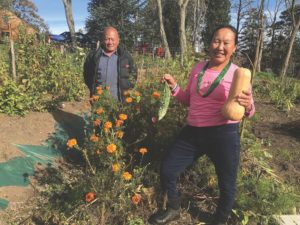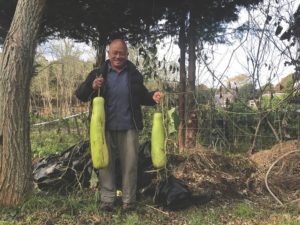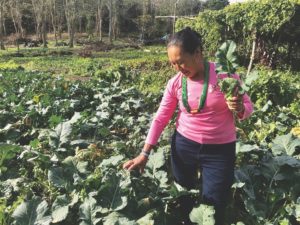
TRURO — Fall hasn’t yet hit Down Home Farm: devoid of the expected autumnal colors, its fields glow green. The growing season isn’t over, and the farm’s cozy stand on Truro Center Road boasts a lush array of radishes, zucchini, arugula, broccoli, and flower bouquets.
This patch of land is cultivated by its tenants, Bhala and Digree Rai, who emigrated from Nepal in 2011 and now call Truro home. The Cape has shaped the Rai family, and they in turn have shaped the land while building friendships and their business. Their story would seem to be a classic American tale of hardworking immigrants building a new life, if not for the shadow cast by the rise of xenophobia and racism now shaping U.S. immigration policy.
Down Home Farm takes up about a third of Ron Singer’s property, which was converted from a sloping lawn to a productive one-acre farm. The Rais brought Nepalese technology to the Cape by constructing terraces along the slight grade to raise their vegetables and flowers in level beds, a technique familiar to them from working in the steep inclines of the Himalayas, Bhala Rai explained.
The Rais use other technologies from Nepal as well, including what they call “Nepalese umbrellas” — mats of leaves reinforced by interwoven bamboo and sewn into a peak at one end. Fitting his head into a band at the peak, Bhala Rai explained that he wears the umbrella, which keeps his head and back dry, so that both hands are free to work.
In December, Bhala plans to build a Nepalese plow. Each spring farmers in Nepal attach water buffalo to these plows and drive the animals through the fields to prepare the soil for millet, sweet potatoes, corn, and rice, Bhala said. He is excited to try out this technique in Truro, although perhaps without the water buffalo.
Every year the couple experiments with new techniques and crops, not all of which are successful. “We’re still learning how to farm,” Bhala said.
This year, Bhala and Digree planted Italian cucuzza squash, which is popular in Nepal for its health benefits. But on the Cape, selling these chartreuse giants, which grow up to three feet long, has been challenging. “They’re very expensive in Nepal, but no one buys them here,” Digree said.

Other experiments have provided immediate benefit. This was their first season using a tractor, which has allowed them to expand the farm. Before, the couple used pitchforks and shovels to turn the soil manually, adding manure to build the topsoil, Digree said.
Although farming has been a fruitful endeavor for the family, Bhala and Digree work side jobs in January and February. The farming itself isn’t easy. “We’ve been working hard,” said Bhala. “Sometimes there’s too much rain or too many mosquitoes.”
Living away from their homeland has also been difficult. Digree showed me photos of her grandchildren, who she hasn’t seen in two years, on her phone. She said that they cannot easily visit here because of visa issues.
Despite some challenges, the Rais have found a home in Truro. “We love it very much,” Bhala said. “It’s been good for us.”
Friends in High Places
Nancy Pease of Truro first met Bhala Rai while trekking in the Himalayas, where he was working as a porter. Pease returned several times on other treks, and the two developed a friendship. Eventually Bhala came to visit Truro over a summer. “I said to him, ‘You’ve shown me all around your country,’ ” Pease said. “ ‘Why don’t I show you around mine?’ ”
Bhala returned for several summers from 2006 to 2010, landscaping and doing yard work for Pease and her neighbors. Work was scarce in Nepal, and he hoped to send money to his youngest son, David, for school in Kathmandu.
In 2010, Bhala applied for and was granted political asylum, and in 2011 Digree and David joined him in Truro. Bhala is now a U.S. citizen, having passed the citizenship test on his first try.
Although the Rais did not disclose the specifics of their asylum case, they left Nepal after years of political unrest and civil war, both of which had resulted in war crimes and forced migration, especially in rural areas.
Pease enjoyed showing the Rais around Cape Cod and introducing them to the community. It gave her a chance to see her home through the eyes of people who had never lived near the sea. “I had to explain high and low tide!” she said.

On the farm, neighbors and visitors frequently stop by to chat with Bhala and Digree. During my brief interview there, a family came by to say hello and ask after the business. They left with gifts of fresh eggs and vegetables.
Challenges to Asylum
U.S. immigration laws for asylum seekers made the Rais’ success story possible. But in recent years, the Trump administration has increasingly targeted refugees to prevent them from entering the country.
Greater Boston Legal Services attorney Nancy Kelly told the Independent that, although the current administration cannot change the law, it can alter the way it is interpreted.
Former Attorney General Jeff Sessions narrowed the definition of who can qualify as a refugee and drastically limited the number of people eligible for asylum in the U.S.
According to the Syracuse University Transactional Records Access Clearinghouse, in 2019, 60 percent of asylum requests have been denied. The denial rate hovered around 40 to 50 percent from 2010 to 2015.
Kelly said that the Trump administration is curtailing asylum especially for Central American refugees.
“The people coming across the border are in large part women and children,” she said. “A lot of those women are fleeing domestic violence or gender-directed violence. There’s huge murder rate in the countries that they’re coming from for women.”
In a 2018 decision, Sessions upended decades of asylum law by proclaiming that domestic violence is not a valid reason to grant asylum. Kelly is disheartened to see her work to gain legal protection for women refugees undermined. “We’ve watched our lives’ work ripped to shreds,” she said.
Pease said that the recent uptick in deportations is “disgusting and frightening.” From her friendship with the Rai family, she also feels deportations represent missed opportunities. “There are so many good people who would make wonderful citizens and contribute to their communities,” she said.



